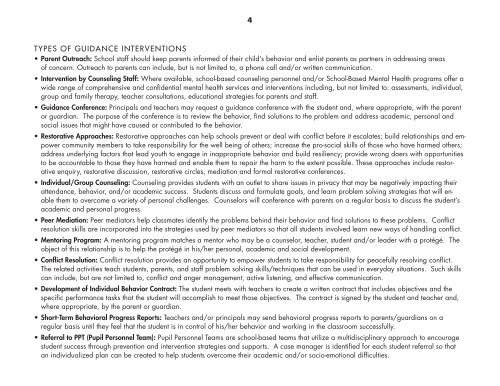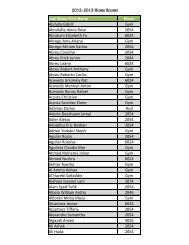standards citywide - New York City Department of Education - NYC ...
standards citywide - New York City Department of Education - NYC ...
standards citywide - New York City Department of Education - NYC ...
You also want an ePaper? Increase the reach of your titles
YUMPU automatically turns print PDFs into web optimized ePapers that Google loves.
4TYPES OF GUIDANCE INTERVENTIONS• Parent Outreach: School staff should keep parents informed <strong>of</strong> their child’s behavior and enlist parents as partners in addressing areas<strong>of</strong> concern. Outreach to parents can include, but is not limited to, a phone call and/or written communication.• Intervention by Counseling Staff: Where available, school-based counseling personnel and/or School-Based Mental Health programs <strong>of</strong>fer awide range <strong>of</strong> comprehensive and confidential mental health services and interventions including, but not limited to: assessments, individual,group and family therapy, teacher consultations, educational strategies for parents and staff.• Guidance Conference: Principals and teachers may request a guidance conference with the student and, where appropriate, with the parentor guardian. The purpose <strong>of</strong> the conference is to review the behavior, find solutions to the problem and address academic, personal andsocial issues that might have caused or contributed to the behavior.• Restorative Approaches: Restorative approaches can help schools prevent or deal with conflict before it escalates; build relationships and empowercommunity members to take responsibility for the well being <strong>of</strong> others; increase the pro-social skills <strong>of</strong> those who have harmed others;address underlying factors that lead youth to engage in inappropriate behavior and build resiliency; provide wrong doers with opportunitiesto be accountable to those they have harmed and enable them to repair the harm to the extent possible. These approaches include restorativeenquiry, restorative discussion, restorative circles, mediation and formal restorative conferences.• Individual/Group Counseling: Counseling provides students with an outlet to share issues in privacy that may be negatively impacting theirattendance, behavior, and/or academic success. Students discuss and formulate goals, and learn problem solving strategies that will enablethem to overcome a variety <strong>of</strong> personal challenges. Counselors will conference with parents on a regular basis to discuss the student’sacademic and personal progress.• Peer Mediation: Peer mediators help classmates identify the problems behind their behavior and find solutions to these problems. Conflictresolution skills are incorporated into the strategies used by peer mediators so that all students involved learn new ways <strong>of</strong> handling conflict.• Mentoring Program: A mentoring program matches a mentor who may be a counselor, teacher, student and/or leader with a protégé. Theobject <strong>of</strong> this relationship is to help the protégé in his/her personal, academic and social development.• Conflict Resolution: Conflict resolution provides an opportunity to empower students to take responsibility for peacefully resolving conflict.The related activities teach students, parents, and staff problem solving skills/techniques that can be used in everyday situations. Such skillscan include, but are not limited to, conflict and anger management, active listening, and effective communication.• Development <strong>of</strong> Individual Behavior Contract: The student meets with teachers to create a written contract that includes objectives and thespecific performance tasks that the student will accomplish to meet those objectives. The contract is signed by the student and teacher and,where appropriate, by the parent or guardian.• Short-Term Behavioral Progress Reports: Teachers and/or principals may send behavioral progress reports to parents/guardians on aregular basis until they feel that the student is in control <strong>of</strong> his/her behavior and working in the classroom successfully.• Referral to PPT (Pupil Personnel Team): Pupil Personnel Teams are school-based teams that utilize a multidisciplinary approach to encouragestudent success through prevention and intervention strategies and supports. A case manager is identified for each student referral so thatan individualized plan can be created to help students overcome their academic and/or socio-emotional difficulties.








